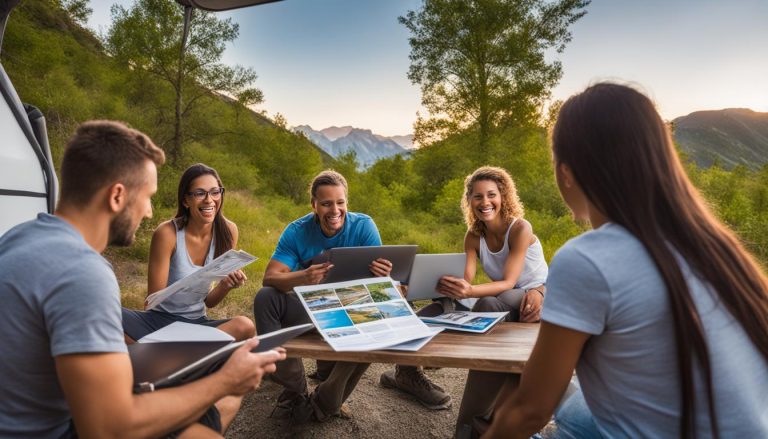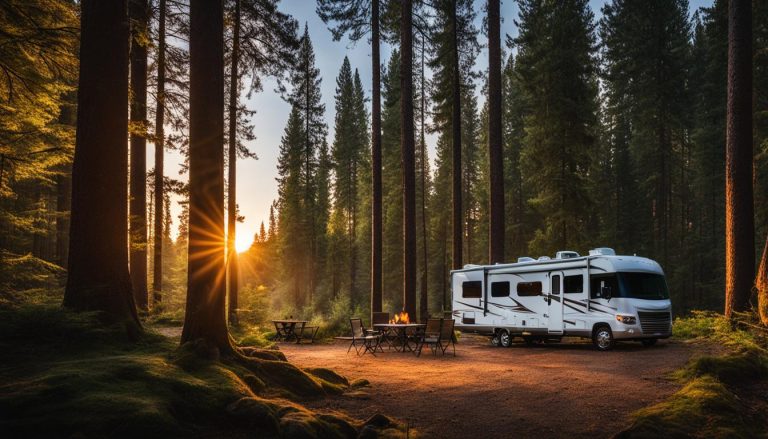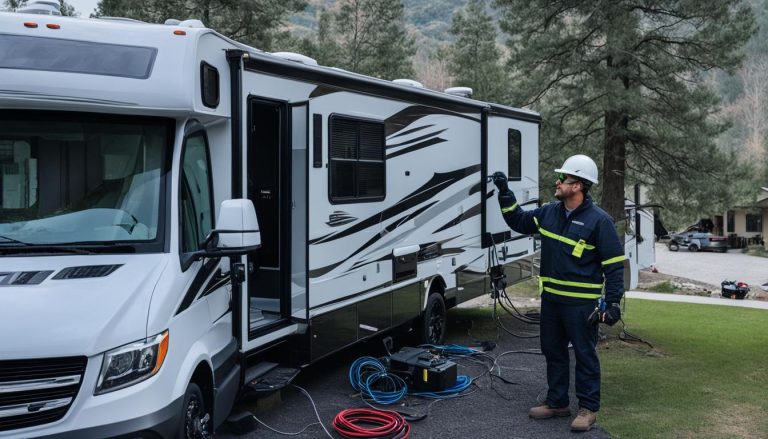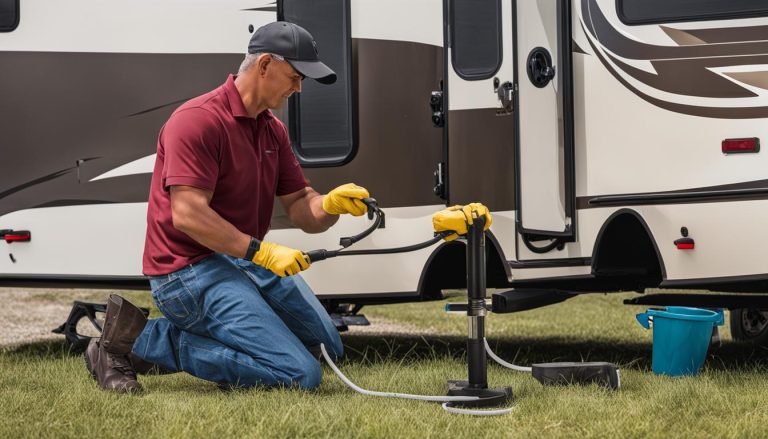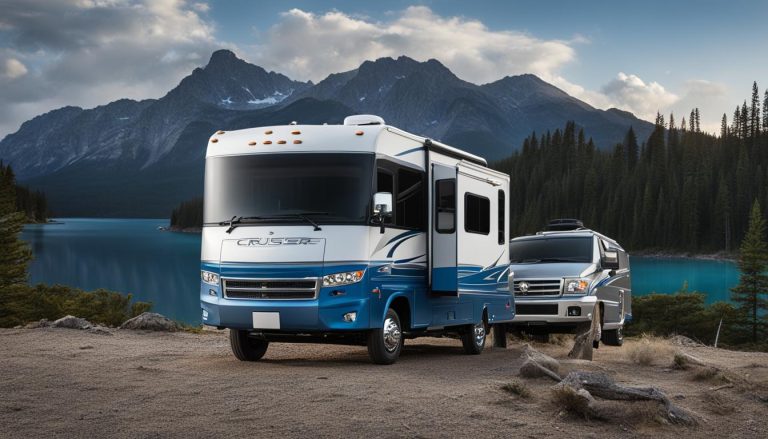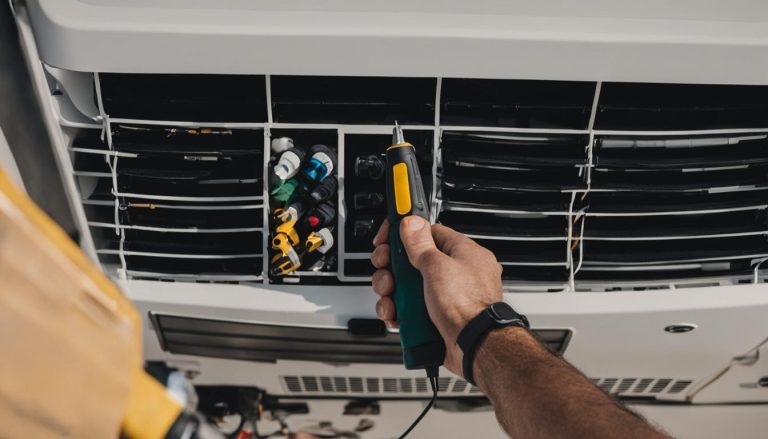Your Guide to RV Ownership: How to Get an RV
gorvlifestyle.com and its partners may earn a commission if you purchase a product through one of our links
Welcome to your comprehensive guide to RV ownership! Whether you’re looking to buy, rent, or finance an RV, this article has got you covered. We’ll explore all aspects of RV ownership, including the benefits of this lifestyle, resources for new RVers, financing options, maintenance tips, trip planning, and more. So if you’ve ever dreamed of hitting the open road and experiencing the freedom of RV travel, you’re in the right place.
Key Takeaways:
- Learn how to navigate the process of getting an RV, whether you choose to buy, rent, or finance.
- Discover the financial costs and benefits of RV ownership to determine if it’s worth the investment for you.
- Explore the numerous benefits of RV ownership, from freedom and flexibility to creating lifelong memories.
- Find valuable resources for new RVers, including websites, forums, and checklists to ensure a smooth transition into RV ownership.
- Understand the different financing options available and how to secure the best financing terms for your RV purchase.
Are you ready to embark on an exciting RV adventure? Let’s dive in!
Is Owning an RV Worth It?
If you’ve ever dreamed of hitting the open road and exploring new destinations, owning an RV can be an enticing option. However, before embarking on your RV journey, it’s essential to consider the financial aspects of RV ownership. Understanding the costs and benefits can help you make an informed decision and determine if owning an RV is worth it for you.
When it comes to RV ownership costs, there are several factors to consider. The initial purchase price can vary depending on the type and size of the RV. Additionally, you’ll need to budget for insurance to protect your investment and cover any potential damages or liability. Annual maintenance costs, including routine servicing and repairs, should also be taken into account. And let’s not forget campground fees if you plan on staying at RV parks or campgrounds during your travels.
However, while there are upfront and ongoing expenses associated with RV ownership, there are also financial benefits that can make it worthwhile. One of the significant advantages is the potential for cost savings on accommodation and food. With an RV, you have the freedom to stay at campgrounds, national parks, or even boondock in beautiful locations, eliminating the need for expensive hotel stays. You can also prepare your meals in the comfort of your RV, saving money on dining out.
The Financial Benefits of Owning an RV
- Save on accommodation costs by staying at campgrounds or boondocking
- Reduce food expenses by cooking meals in your RV
- Avoid costly flights and transportation expenses
- Enjoy the potential for long-term cost savings compared to traditional vacations
- Opportunity to generate income by renting out your RV when you’re not using it
“Owning an RV can be a financially savvy choice, allowing you to travel on your terms and potentially save money in the long run.”
Overall, the financial aspects of owning an RV can vary depending on your travel style, budget, and personal preferences. It’s important to consider both the costs and benefits before making a decision. Understanding the potential for cost savings and the freedom of RV travel can help you determine if owning an RV is a worthwhile investment, both financially and for the adventure it offers.
The Benefits of RV Ownership
Switching to the RV lifestyle offers numerous advantages that go beyond the traditional travel experience. Whether you’re seeking freedom, flexibility, or a deeper connection with nature, owning an RV opens up a world of possibilities. Here are the top reasons why you should consider embracing the RV lifestyle:
1. Freedom and Flexibility
With an RV, you have the freedom to embark on spontaneous trips or plan extensive journeys with ease. You’re not tied to hotel bookings or flight schedules, giving you the flexibility to explore new destinations whenever you please. Whether it’s a weekend getaway to a scenic national park or an extended road trip across the country, the choice is yours.
2. Explore New Places and Experience Nature
Owning an RV allows you to discover hidden gems and off-the-beaten-path destinations that may not be easily accessible by traditional means. You can immerse yourself in the beauty of nature, waking up to breathtaking views and falling asleep under a starlit sky. From majestic mountains to picturesque lakeshores, every day can be a new adventure.
3. Create Lifelong Memories and Connections
The RV lifestyle fosters a sense of community and provides countless opportunities to connect with like-minded individuals. Whether it’s chatting with fellow travelers at campgrounds or joining RV clubs and events, you’ll meet people who share your passion for exploration. These connections can lead to lifelong friendships and unforgettable shared experiences.
“The RV lifestyle offers the perfect blend of freedom, adventure, and camaraderie. It’s an invitation to make every moment count and create a lifetime of cherished memories.”
4. Cost Savings and Convenience
Owning an RV can also be a cost-effective alternative to traditional travel methods. You’ll enjoy savings on accommodation expenses, as your RV serves as your home-on-wheels. Additionally, the convenience of having your own kitchen allows you to prepare meals, reducing dining expenses. Moreover, you gain access to RV-friendly campgrounds and free camping sites, further maximizing your budget.
5. Flexibility to Customize and Personalize
Unlike hotel rooms or vacation rentals, an RV is a blank canvas that you can personalize according to your taste and preferences. You can decorate your space, add convenient features, and create a cozy, home-like environment that reflects your unique style. This level of customization enhances the overall comfort and enjoyment of your RV lifestyle.
6. Health and Well-being
The RV lifestyle encourages an active and outdoor-oriented lifestyle, which can have a positive impact on your physical and mental well-being. Being closer to nature, engaging in outdoor activities, and regularly experiencing new environments can boost your mood, reduce stress, and improve your overall health.
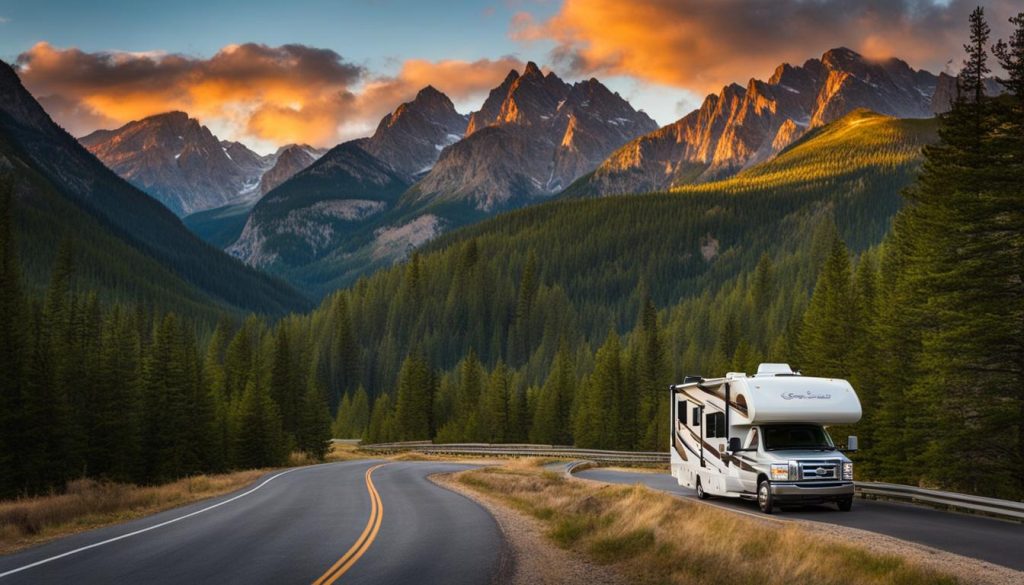
As you can see, the benefits of RV ownership extend far beyond the typical travel experience. Whether it’s the freedom to roam, the opportunity to connect with nature, or the chance to build lifelong memories, embracing the RV lifestyle offers a unique and rewarding way to explore the world.
| Benefits of RV Ownership | Reasons to Switch to the RV Lifestyle |
|---|---|
| Freedom and Flexibility | Explore New Places and Experience Nature |
| Create Lifelong Memories and Connections | Cost Savings and Convenience |
| Flexibility to Customize and Personalize | Health and Well-being |
Resources for New RVers
As a new RVer, you may feel overwhelmed by the prospect of embarking on your RV ownership journey. But fear not, because there are plenty of resources available to help you navigate this exciting new chapter of your life. Whether you’re preparing for RV ownership or just starting your first few months as an RVer, these resources will provide you with valuable information, tips, and advice.
Online Communities and Forums
Connecting with other RV enthusiasts is a great way to learn from their experiences and gain insights into the RV lifestyle. Join online communities and forums where you can ask questions, share stories, and find support. Here are a few popular online RV communities:
- RV.net: A comprehensive forum where you can connect with fellow RVers, ask questions, and get advice on various RV topics.
- iRV2: An active community of RV enthusiasts who share their knowledge, tips, and experiences to help others navigate the world of RV ownership.
- The RV Life: A community-driven website that offers resources, articles, and a forum to connect with like-minded RVers.
Websites and Blogs
There are numerous websites and blogs dedicated to RVing, offering a wealth of information on everything from buying an RV to travel tips and maintenance. These resources will provide you with valuable insights and guidance throughout your RV ownership journey. Here are a few popular RV websites and blogs:
- RVshare: A platform that connects RV owners with renters, RVshare also offers an extensive blog filled with articles on RV ownership, travel destinations, and tips for new RVers.
- GoRVing: The official website of the RV industry, GoRVing provides comprehensive resources on RVing, including buying guides, RV types, destination ideas, and more.
- The Wandering RV: A blog run by full-time RVers, The Wandering RV offers practical tips, advice, and insights into the RV lifestyle.
RV Checklist and Guides
When it comes to preparing for RV ownership and ensuring a smooth transition into RV life, checklists and guides can be extremely helpful. These resources will assist you with setting up and maintaining your RV, as well as provide tips for navigating the RV lifestyle. Here are a few useful RV checklists and guides:
- Camping World RV Checklist: A comprehensive checklist for setting up, maintaining, and prepping your RV for travel, available on the Camping World website.
- RV Education 101: RV expert Mark Polk offers a range of educational resources, including instructional videos, eBooks, and checklists for RV maintenance and safety.
- The Complete Idiot’s Guide to RVing: A popular guidebook written by Brent Peterson, covering all aspects of RV ownership, from choosing the right RV to troubleshooting common issues.
Remember, these resources are just a starting point. As you embark on your RV ownership journey, don’t be afraid to explore further and discover new resources that resonate with your specific needs and interests. The RV community is full of knowledgeable and friendly individuals who are always willing to help fellow RVers.
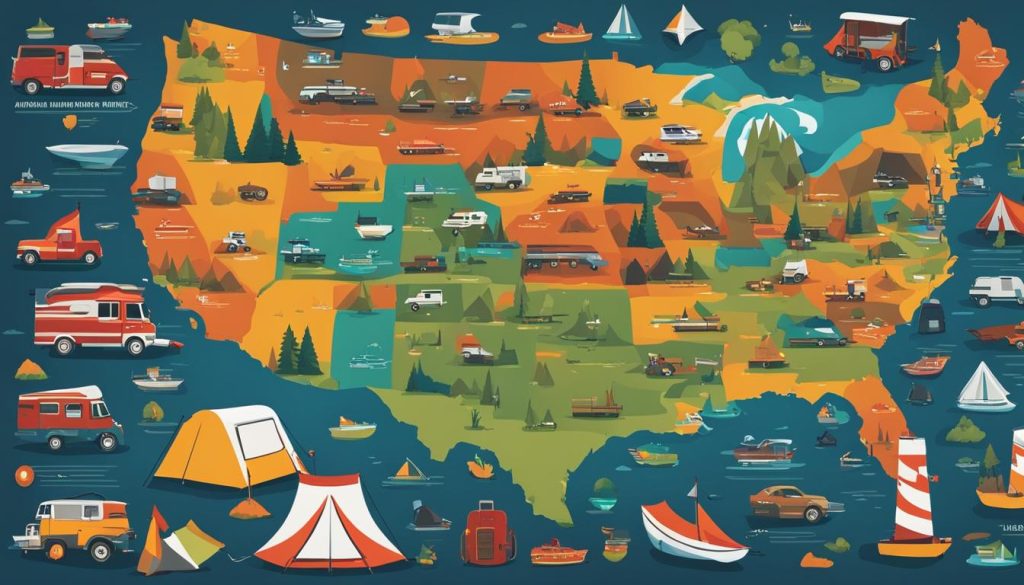
RV Financing
When it comes to purchasing an RV, financing options can help make your dream a reality. Understanding how to finance an RV and comparing RV loan rates is crucial in finding the best option for your budget. In this section, we’ll explore different RV financing options, discuss how to finance an RV, and provide tips to ensure you secure the most favorable terms.
Types of RV Financing
There are various types of RV financing available, each with its own terms and conditions. Let’s take a look at the most common options:
- Bank or Credit Union Loans: Many banks and credit unions offer RV loans with competitive interest rates. These loans typically require a down payment and are secured by the RV as collateral.
- RV Dealership Financing: RV dealerships often have partnerships with lending institutions and can offer financing options directly. This can streamline the financing process, but it’s important to compare rates and terms to ensure you’re getting a competitive offer.
- Online Lenders: Online lenders specialize in RV financing and may offer more flexible terms and lower rates. Research reputable online lenders and compare their offers to find the best fit for your needs.
- Home Equity Line of Credit (HELOC): If you have substantial equity in your home, a HELOC can be used to finance an RV. This option may have tax advantages, but be aware that your home could be at risk if you default on the loan.
Factors Affecting RV Loan Rates
Several factors can impact the interest rates and loan terms you’re offered when financing an RV. It’s important to be aware of these factors before applying for a loan:
- Your credit score and credit history
- The loan amount and duration
- The type and age of the RV
- The down payment amount
Tips for Finding the Best RV Financing Options
When searching for RV financing, consider the following tips to ensure you find the best options:
- Shop around and compare rates from different lenders.
- Get pre-approved for a loan before visiting RV dealerships.
- Consider working with an RV finance specialist who can guide you through the process.
- Read the fine print and understand all terms and conditions before signing any loan agreement.
With the right RV financing in place, you can turn your dream of owning an RV into a reality. Take the time to research your options, compare rates, and find the financing solution that best fits your needs and budget.
RV Maintenance & Safety Tips
When it comes to RV ownership, staying safe on the road and taking proper care of your vehicle are top priorities. By following these RV maintenance tips and implementing a comprehensive safety checklist, you can prevent accidents and ensure the longevity of your RV.
- Regular maintenance tasks: Regularly checking your RV for any issues or potential problems is crucial. Make sure to inspect the tires, brakes, and lights before every trip. Additionally, don’t forget to check the fluid levels, clean the air filters, and maintain the generator.
- Essential safety equipment: Equipping your RV with the necessary safety equipment is vital for your well-being. Install smoke detectors, carbon monoxide detectors, and fire extinguishers in appropriate locations throughout your RV. Also, consider investing in a quality surge protector to safeguard your electrical system.
- Preventing accidents: Taking precautions to prevent accidents is essential. Always follow speed limits, buckle up when driving, and avoid distractions. It’s also important to maintain a safe distance from other vehicles on the road and regularly check your blind spots.
- Regular inspections and servicing: Schedule regular inspections and servicing for your RV to identify and address any potential issues. This includes getting routine oil changes, checking the battery, and inspecting the roof for any leaks or damage. Regular servicing will help keep your RV in optimal condition and ensure your safety on the road.
Remember, taking proactive measures in RV maintenance and safety can save you from costly repairs and untoward incidents during your travels. Prioritize regular inspections, implement an RV safety checklist, and practice safe driving habits to enjoy worry-free adventures.
“Regular inspections and servicing are essential for keeping your RV in top shape and ensuring your safety on the road.” – RV enthusiast
| RV Maintenance Tips | RV Safety Checklist | Preventing RV Accidents |
|---|---|---|
| Regularly check tires, brakes, and lights | Install smoke detectors, carbon monoxide detectors, and fire extinguishers | Follow speed limits and avoid distractions |
| Monitor fluid levels and clean air filters | Equip your RV with a surge protector | Maintain a safe driving distance and check blind spots |
| Schedule routine oil changes and battery checks | ||
| Inspect the roof for leaks or damage |
RV Trip Planning & Camping
Planning the perfect RV trip requires careful consideration and research. From finding the ideal campgrounds to practicing good campground etiquette and adopting sustainable camping practices, these tips will help you make the most of your RV adventures.
Researching and Selecting Campgrounds
When planning your RV trip, take the time to research and select the right campgrounds for your needs. Consider factors such as location, amenities, and reviews from other campers.
Use ReserveAmerica or Campendium to find campgrounds that meet your criteria. These websites provide detailed information and reviews to help you make informed choices.
Campground Etiquette
Show respect for fellow campers and the environment by following campground etiquette guidelines. Practice good manners and adhere to the rules established by each campground.
Here are a few important campground etiquette tips to keep in mind:
- Keep noise levels to a minimum, especially during quiet hours.
- Properly dispose of trash and recycling in designated containers.
- Respect other campers’ privacy and personal space.
- Be mindful of your pets and clean up after them.
Sustainable Camping Practices
As RV enthusiasts, it’s essential to embrace sustainable camping practices to minimize our impact on the environment. By adopting these practices, you can enjoy the great outdoors while preserving it for future generations.
Here are some sustainable camping tips:
- Conserve water by taking shorter showers and using water-saving fixtures.
- Minimize waste by packing reusable containers and utensils, and properly dispose of any waste in designated areas.
- Choose environmentally friendly cleaning products to avoid polluting water sources.
- Opt for solar power or energy-efficient appliances to reduce your energy consumption.
Remember, practicing sustainable camping not only helps protect the environment but also sets a positive example for other campers.
Should You Rent Instead of Purchase?
If you’re considering the RV lifestyle but don’t want to commit to buying an RV just yet, renting could be a great option for you. Renting an RV provides flexibility, cost savings, and the opportunity to explore different RV types before making a long-term investment.
One of the biggest benefits of renting an RV is the flexibility it offers. You have the freedom to choose when and where you want to travel without the commitment of owning an RV. Whether you want to take a spontaneous weekend getaway or plan a cross-country adventure, renting allows you to adapt your travel plans according to your needs and desires.
Another advantage of renting is the cost savings. Purchasing an RV can be a significant financial investment, but renting allows you to enjoy the RV experience without the hefty price tag. You only pay for the time you use the RV, and you don’t have to worry about long-term ownership costs such as insurance, maintenance, and storage.
While renting an RV offers many benefits, it’s important to consider the potential drawbacks as well. One downside is the limited availability of rental units, especially during peak travel seasons. Additionally, rental RVs may have restrictions or limitations on customization, as they need to be returned in the same condition as when they were rented. However, many rental companies provide well-maintained and fully equipped RVs, ensuring you have a comfortable and enjoyable experience.
When deciding whether to rent or purchase an RV, consider your individual circumstances and priorities. If you’re new to the RV lifestyle or unsure about long-term commitment, renting gives you the chance to try before you buy. On the other hand, if you’re a frequent traveler and have a strong desire for personalization and ownership, purchasing an RV may be the better option for you. Ultimately, it’s a personal decision that depends on your lifestyle, goals, and budget.
FAQ
How do I finance the purchase of an RV?
There are various options available for financing an RV purchase. You can apply for an RV loan through a bank or credit union, or you can explore financing programs offered by RV dealerships. It’s important to compare interest rates and loan terms to find the best financing option for your needs. Getting pre-approved for a loan can also help streamline the buying process.
What are the costs associated with owning an RV?
The costs of RV ownership can vary depending on factors such as the type and size of the RV, insurance coverage, maintenance needs, and campground fees. In addition to the purchase price, you will need to factor in ongoing expenses such as insurance premiums, fuel costs, regular maintenance, and campground or RV park fees. It’s important to budget for these costs to ensure a realistic financial plan.
What are the benefits of owning an RV?
Owning an RV offers numerous benefits. You have the freedom and flexibility to travel at your own pace, explore new places, and experience nature firsthand. RV ownership also allows you to create lifelong memories and connections with other RV enthusiasts. Additionally, owning an RV can save you money on accommodation and food costs while traveling, making it a cost-effective way to enjoy the RV lifestyle.
Where can I find resources to help me as a new RVer?
There are many resources available for new RVers. Websites and online communities dedicated to RVing provide valuable information, tips, and advice. You can also find helpful checklists for setting up and maintaining your RV, as well as guidance on navigating the RV lifestyle. It’s important to take advantage of these resources to ensure a smooth transition into RV ownership.
Should I rent an RV instead of purchasing one?
Renting an RV can be a great option, especially if you’re unsure about committing to ownership. Renting allows you to try out different RV types and sizes before making a purchase. It also offers flexibility in terms of choosing when and where to travel, and it can be more cost-effective for occasional or short-term use. However, keep in mind that renting may have limitations such as availability and restrictions on customization.

